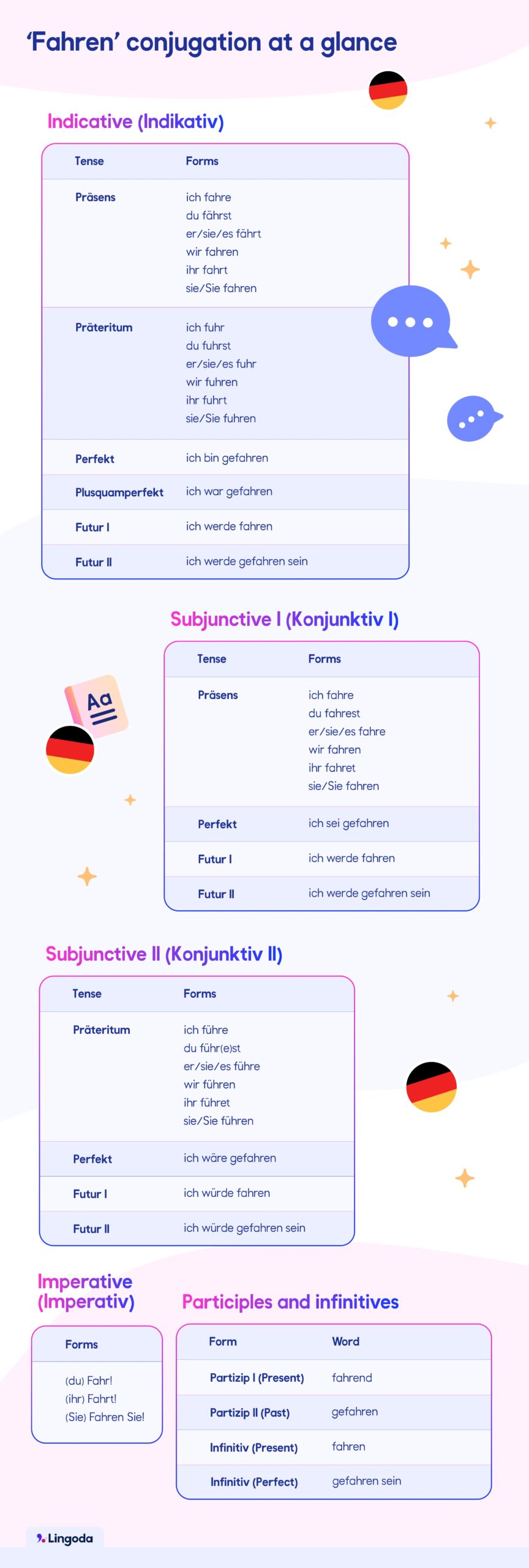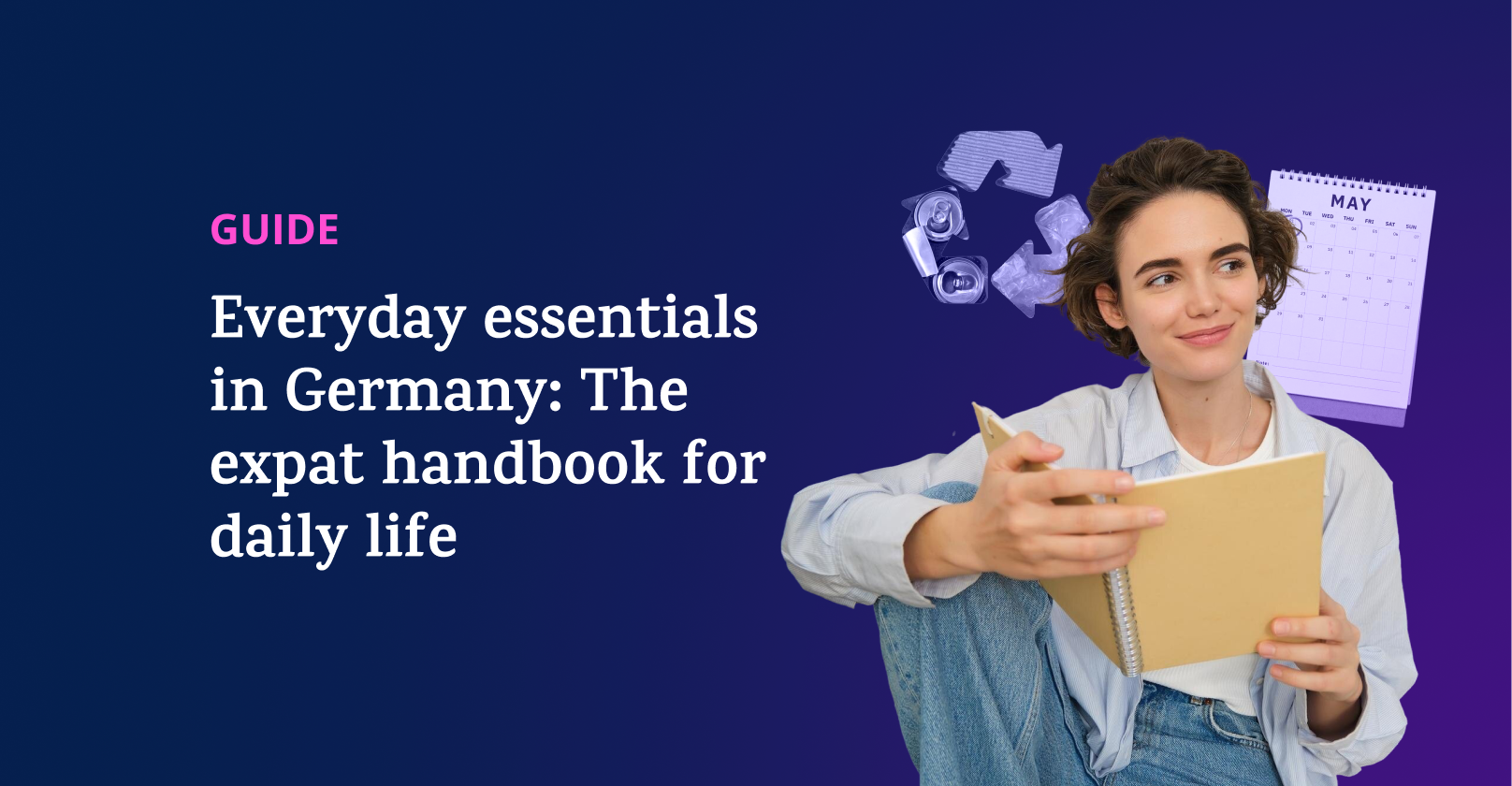‘Fahren’ conjugation in German: The complete guide for every tense
If you’ve ever talked in German about driving, riding or even sailing, you’ve likely used the verb fahren.

This versatile verb describes the action of traveling in a vehicle, whether you’re driving a car, riding a bike or cruising down a river. But before you can use fahren like a native, you’ll need to master the fahren conjugation in all its tenses.
In this guide, we’ll break it all down — from present tense to future perfect — with clear tables, cultural notes and usage tips. You’ll also learn when fahren plays nicely with other travel verbs (like reisen), and when it doesn’t. Buckle up, we’re going on a grammatical road trip!
- Overview of all the tenses of the fahren conjugation
- What does fahren mean in German?
- Is fahren regular or irregular?
- Fahren in the present tense (Präsens)
- Fahren in the simple past (Präteritum)
- Fahren in the present perfect (Perfekt)
- Fahren in the past perfect (Plusquamperfekt)
- Fahren in the future tense (Futur I and Futur II)
- Fahren in the imperative mood
- Fahren in the subjunctive mood (Konjunktiv I and Konjunktiv II)
- Fahren vs. reisen: Which verb should you use?
- FAQs
Overview of all the tenses of the ‘fahren’ conjugation
Fahren is an irregular, stem-changing verb; in the present tense, a → ä in the du and er/sie/es forms. In compound tenses, fahren is coupled with either sein or haben as an auxiliary verb, depending on the context in which it’s used:
- Use sein when fahren indicates actual movement from one place to another.
- Use haben when it focuses on the act of driving or is used figuratively.
Here’s a bird’s-eye view of the main tenses of fahren:
| Present | Simple past | Present perfect | Past perfect | Future I | Future II | |
| ich | fahre | fuhr | bin/habe gefahren | war/hatte gefahren | werde fahren | werde gefahren sein* |
| du | fährst | fuhrst | bist/hast gefahren | warst/hattest gefahren | wirst fahren | wirst gefahren sein* |
| er/sie/es | fährt | fuhr | ist/hat gefahren | war/hatte gefahren | wird fahren | wird gefahren sein* |
| wir | fahren | fuhren | sind/haben gefahren | waren/hatten gefahren | werden fahren | werden gefahren sein* |
| ihr | fahrt | fuhrt | seid/habt gefahren | wart/hattet gefahren | werdet fahren | werdet gefahren sein* |
| sie/Sie | fahren | fuhren | sind/haben gefahren | waren/hatten gefahren | werden fahren | werden gefahren sein* |
* or werden gefahren haben, if you’re conjugating with haben.

Learn German with Lingoda
How it works

What does ‘fahren’ mean in German?
Fahren covers three main ideas: to drive, to travel and to go — but always by some kind of vehicle (car, bus, train, boat, bike, etc.). If your feet are doing the work, you’ll want gehen (to walk, to go). If you’re talking about traveling without focusing on the means of transport, it’s reisen. If there are wheels, rails or sails involved, fahren is usually your go-to verb.
Is ‘fahren’ regular or irregular?
Fahren is an irregular verb — more specifically, a strong verb in German grammar. That means it doesn’t just add predictable endings; it also changes its stem vowel sometimes. In the du and er/sie/es forms of the present tense, the stem vowel a becomes ä:
- du fährst (you drive/travel)
- er fährt (he drives/travels)
Why the vowel change? Strong verbs in German keep one foot in the past — the vowel shifts reflect a historical pattern that goes back to Old High German. There’s no magic trick for remembering them, but they’re predictable once you know the pattern: many verbs with a in the stem do the same (laufen → du läufst, schlafen → du schläfst).

‘Fahren’ in the present tense (‘Präsens’)
Like in English, this tense can cover current actions, confirmed actions in the future, and regular habits.
| ich | fahre |
| du | fährst |
| er/sie/es | fährt |
| wir | fahren |
| ihr | fahrt |
| sie/Sie | fahren |
- Commuting: Ich fahre jeden Morgen mit dem Bus zur Arbeit. (I ride the bus to work every morning.)
- Traveling: Ich fahre gerade zur Uni. (I’m on my way to university.)
- Driving: Fährst du heute Abend oder soll ich? (Are you driving tonight or should I?)
‘Fahren’ in the simple past (‘Präteritum’)
In spoken German, you’ll almost always hear the Perfekt tense when discussing actions in the past. But the Präteritum is commonly used in written language (novels, news articles, reports, etc.), so if you want to read fluently and go beyond survival German, you’ll need to learn it.
| ich | fuhr |
| du | fuhrst |
| er/sie/es | fuhr |
| wir | fuhren |
| ihr | fuhrt |
| sie/Sie | fuhren |
- Ich fuhr letztes Jahr durch ganz Österreich. (I drove through all of Austria last year.)
- Er fuhr damals noch ohne Navi. (Back then, he drove without a GPS.)
‘Fahren’ in the present perfect (‘Perfekt’)
The Perfekt is the go-to past tense in spoken German. It’s formed with an auxiliary verb (haben or sein) plus the past participle (in this case, gefahren).
Use sein when fahren implies a change of location (i.e., you actually went somewhere).
- Ich bin nach Berlin gefahren. (I went to Berlin.)
Use haben when fahren focuses on the act of driving, rather than the arrival.
- Ich habe den Bus gefahren. (I rode the bus.)
| ich | bin/habe gefahren |
| du | bist/hast gefahren |
| er/sie/es | ist/hat gefahren |
| wir | sind/haben gefahren |
| ihr | seid/habt gefahren |
| sie/Sie | sind/haben gefahren |
Here, the auxiliary verb goes second, and the participle (gefahren) lands at the end:
- Ich bin nach Köln gefahren. (I drove to Köln.)
- Ich habe den LKW gefahren. (I drove the truck.)
‘Fahren’ in the past perfect (‘Plusquamperfekt’)
The Plusquamperfekt is the “past of the past.” It tells the listener that one action happened before another past action.
With fahren, it’s built using the Präteritum form of the auxiliary verb (sein or haben) plus the past participle (gefahren).
| ich | war/hatte gefahren |
| du | warst/hattest gefahren |
| er/sie/es | war/hatte gefahren |
| wir | waren/hatten gefahren |
| ihr | wart/hattet gefahren |
| sie/Sie | waren/hatten gefahren |
- Als ich ankam, war er schon nach Hause gefahren. (When I arrived, he had already gone home.)
‘Fahren’ in the future tense (‘Futur I’ and ‘Futur II’)
‘Futur I’ conjugation and usage
The Futur I describes actions that will happen in the future; it can also be used to express intentions. Form it by using the present tense conjugation of the auxiliary verb werden plus the infinitive form of fahren.
| ich | werde fahren |
| du | wirst fahren |
| er/sie/es | wird fahren |
| wir | werden fahren |
| ihr | werdet fahren |
| sie/Sie | werden fahren |
- Discussing travel plans: Morgen werde ich nach Berlin fahren. (Tomorrow I will go to Berlin.)
- Expressing intentions: Wir werden am Wochenende ans Meer fahren. (We will drive to the sea this weekend.)
- Predicting: Er wird zu spät fahren. (He will probably leave too late.)
‘Futur II’ overview
Futur II expresses that an action will have been completed by a certain future time. It’s formed with these three ingredients: werden (present) + gefahren (past participle) + sein/haben (infinitive at the end).
- Nächste Woche werde ich nach Leipzig gefahren sein. (By next week, I will have gone to Leipzig.)
- Bis Sonntag werden wir 1.000 Kilometer gefahren haben. (By Sunday, we will have driven 1,000 kilometers.)
Temporal indicators (‘morgen,’ ‘später,’ ‘bis dahin’)
German often uses specific time markers to make the future tense clear, as the present tense can also refer to the future. Here are some common temporal indicators to memorize:
- morgen – tomorrow
- später – later
- bis dahin – by then
- nächste Woche – next week
- übermorgen – the day after tomorrow
‘Fahren’ in the imperative mood
The imperative form of fahren is for giving direct instructions — whether you’re telling a friend to “turn right” or politely asking a taxi driver to “please drive straight ahead.”
| du | fahr(e) |
| ihr | fahrt |
| Sie | fahren |
- Fahrt los! (Set off!)
- Fahren Sie bitte gerade aus! (Please drive straight ahead!)
Quick tips:
- The -e in Fahr(e) is optional; dropping it is more common in everyday speech.
- Add direction words (rechts, links, geradeaus) for travel instructions.
- Fahren + los (Fahr los!) is an easy way to say “Get going!”
- Use the informal (du/ihr) version for friends, family or peers.
- Use the formal (Sie) version for strangers, service interactions or polite contexts.
‘Fahren’ in the subjunctive mood (‘Konjunktiv I’ and ‘Konjunktiv II’)
Konjunktiv I is used to report speech without directly quoting the speaker or claiming a subjective opinion (e.g., “He says he is driving.”). It’s common in news articles, official statements and storytelling mediums.
| ich | fahre |
| du | fahrest |
| er/sie/es | fahre |
| wir | fahren |
| ihr | fahret |
| sie/Sie | fahren |
- Er sagt, ich fahre morgen. (He says I’m driving tomorrow.)
- Sie berichten, wir fahren bald ab. (They report we’re leaving soon.)
Konjunktiv II expresses hypothetical situations, wishes or polite requests (e.g., “If I could, I would drive to Italy.”). This is the “if/then” and “I wish” mood, though it’s also handy for politeness.
| ich | führe |
| du | führest |
| er/sie/es | führe |
| wir | führen |
| ihr | führet |
| sie/Sie | führen |
- Ich führe gern durch die Alpen, wenn ich Zeit hätte. (I would love to drive through the Alps if I had time.)
- Ihr führet schneller, wenn die Straße frei wäre. (You would drive faster if the road were clear.)
Tip: Think of Konjunktiv I as “I heard it” and Konjunktiv II as “I wish it.”
‘Fahren’ vs. ‘reisen’: Which verb should you use?
Fahren and reisen can overlap in English (just like als, wenn or wann). In this case, the difference is based on how you’re moving and what you’re emphasizing.
‘Fahren’: Movement by vehicle
Use fahren for going somewhere in a vehicle, whether it be a car, train, bus, bike, tram or boat). It’s about the act of traveling, rather than the overall experience of the journey.
- Wir fahren morgen mit dem Zug nach Köln. (We’re going to Köln by train tomorrow.)
- Fährst du gern Fahrrad? (Do you like cycling?)
‘Reisen’: The journey itself
Reisen focuses on the overall travel experience, and it’s often associated with longer distances or leisure travel. It’s not tied to a specific vehicle; in fact, the mode of transport is irrelevant.
- Wir reisen im Sommer nach Italien. (We’re traveling to Italy in summer.)
- Sie reist gern in ferne Länder. (She likes traveling to distant countries.)
What are the three forms of ‘fahren’?
Fahren can take on many forms depending on its tense, but the three main forms you should memorize first include the following:
- Infinitive: fahren
- Simple past: fuhr
- Past participle: gefahren
Is ‘fahren’ a regular verb?
No, it’s an irregular (strong) verb that features the vowel change a → ä in certain conjugations.
Ready to use the ‘fahren’ conjugation like a native speaker?
Mastering the fahren conjugation means you can talk about driving to work, taking a weekend trip or even future travel plans with confidence. We’ve covered every tense, from present to future perfect — plus commands, subjunctive moods and how fahren compares to reisen. You’ve learned when the stem changes, when to use haben or sein, and how context shapes your choice of tense.
With this knowledge, you’re ready to sound more natural in both casual chats and formal writing. And if you want to turn grammar into real-life fluency, learning German with Lingoda’s native-level teachers and practical classes can get you there — one ride at a time!

Learn German with Lingoda
How it works

















